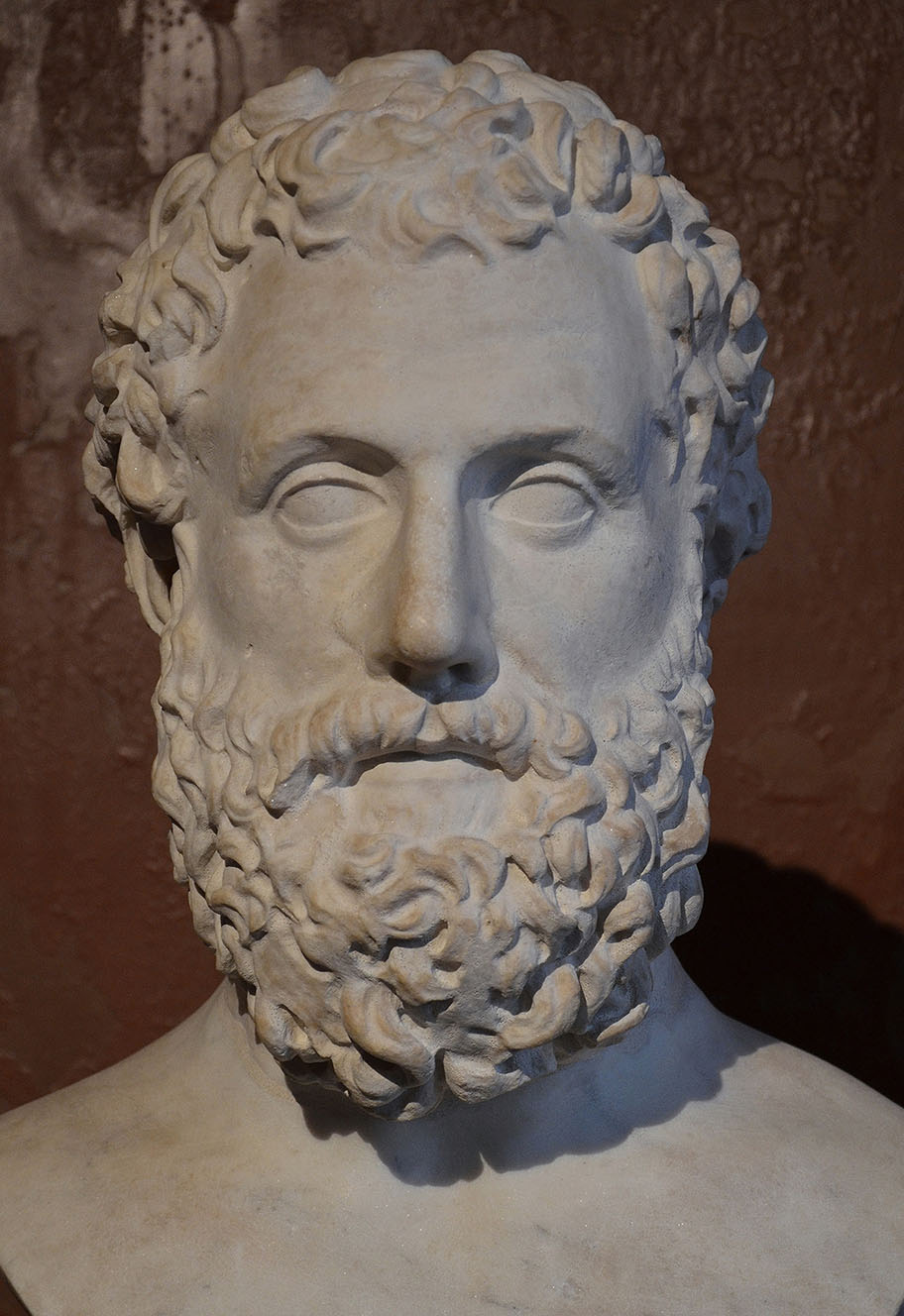Aeschylus
Born:
C. 525/524BC
Died:
C. 456/455BC
Aeschylus was an ancient Greek playwright, often referred to as the "Father of Tragedy." He was one of the most prominent dramatists of his time, and his works profoundly impacted the development of Greek tragedy. Here are some key points about Aeschylus and his contributions:
Life and Background: Aeschylus was born in Eleusis, a town near Athens, in the early 5th century BCE. He came from a noble family and had direct experience with the Persian Wars, which influenced his works.
Military Service: Aeschylus fought in the Battle of Marathon in 490 BCE, where the Greeks successfully repelled the Persian invasion. His military experience often found expression in his plays, particularly in themes related to war and its impact on individuals and society.
Theatrical Innovations: Aeschylusis credited with introducing significant innovations to Greek drama. He added a second actor to the stage, expanding the dialogue and character interaction possibilities. He also increased the number of speaking parts in a play, allowing for more complex and nuanced storytelling.
Tragedies: Aeschylus wrote over 70 plays, but only seven tragedies have survived to the present day. These seven are known as the "Seven Against Thebes," "The Suppliants," "Prometheus Bound," "Agamemnon," "The Libation Bearers" (also known as "Choephori"), "Eumenides," and "The Persians." His works often explored themes of fate, justice, the consequences of war, and the conflict between divine and human will.
Oresteia Trilogy: The trilogy composed of "Agamemnon," "The Libation Bearers," and "Eumenides" is one of Aeschylus's most famous and enduring contributions. It follows the House of Atreus and explores the concept of justice, culminating in the establishment of the Athenian legal system.
Prometheus Bound: "Prometheus Bound" is another notable work by Aeschylus, focusing on the Titan Prometheus, who defies Zeus to bring fire and knowledge to humanity. The play explores themes of rebellion, suffering, and divine justice.
Recognition and Awards: Aeschylus won various awards in the dramatic competitions of the City Dionysia, a festival in Athens dedicated to the god Dionysus and featuring theatrical performances.
Death: Aeschylus died in Gela, Sicily, in 456/455 BCE. According to a legend, he met his end when an eagle mistook his bald head for a stone and dropped a tortoise on it, mistaking it for a shell. Aeschylus played a crucial role in shaping the tragic form, and his influence extended to later playwrights, including Sophocles and Euripides. His contributions to Greek drama continue to be studied and appreciated for their thematic depth and dramatic innovations.

Quick Facts
- Of the ninety or so plays Aeschylus is thought to have written, only seven have survived.
- Aeschylus was the first of the great Greek tragedians – indeed, he helped to invent the genre.
- Despite this, his epitaph makes no mention of his plays – only his soldiering.
- Legend has it that Aeschylus died when a tortoise fell on his head.
- One of his sons went on to beat two of the greatest tragedians at the City Dionysia.
Further Reading
Art &
Architecture
Ancient Greek art and architecture, with its harmonious proportions and timeless elegance, continue to inspire awe and admiration millennia later.
Discover
Greek Mythology & Mythical Characters
Greek mythology, a rich tapestry of gods, heroes, and mythical creatures, captivates the imagination with its tales of love, betrayal, and epic adventures that delve into the depths of the human psyche.
Discover
Ancient Greek History
Ancient Greek history, marked by remarkable achievements in democracy, philosophy, and warfare, shaped the foundation of Western civilization, leaving an indelible legacy of innovation and cultural influence that continues to resonate to this day.
Discover
Ancient Greek Olympics
The ancient Greek Olympics, held in Olympia every four years, celebrated athleticism, unity, and cultural pride, serving as a testament to the enduring spirit of competition and excellence that transcends time and borders.
Discover
Ancient Greek Wars
Ancient Greek wars, such as the Persian Wars and the Peloponnesian War, were pivotal conflicts that shaped the course of history, highlighting the struggle for power, independence, and the clash of civilizations in the ancient Mediterranean world.
Discover
Ancient Greek Culture and Society
Ancient Greek culture and society, characterized by its emphasis on art, philosophy, and civic engagement, fostered a vibrant intellectual and social landscape where innovation flourished, democracy thrived, and the pursuit of knowledge and excellence was celebrated as fundamental values of civilized life.
Discover